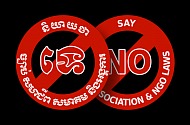Laws / Regulations
Statement | Severe Violations of the Labour Rights and Basic Freedoms of the Trade Union at NagaWorld Limited1 December 2021
We, as representatives of trade union confederations, federations, associations and civil society organisations working to promote human rights and labour rights in the Kingdom of Cambodia are extremely disappointed with the intention and attempts to dissolve the union leadership structure and the unreasonable and unacceptable planned systematic reduction of staff during the COVID-19 crisis at NagaWorld Limited.
19 February 2021
We, the undersigned civil society groups, are seriously concerned about the sub-decree on the establishment of the national internet gateway (NIG) issued on Monday, 16 February, and call on the government to immediately repeal this sub-decree.
18 December 2020
The Cambodian League for the Promotion and Defense of Human Rights (LICADHO) today is releasing “The Fight for Freedom: Attacks on Human Rights Defenders, 2018-2020”.“The Fight for Freedom” is not an exhaustive list of all attacks targeting human rights defenders since the beginning of 2018. Instead, it highlights a number of high-profile cases where human rights defenders have been targeted for intimidation, arrest or imprisonment while trying to peacefully exercise their rights to association, assembly and expression as guaranteed both in Cambodia’s constitution and under international law.
10 December 2020
Family members of at least five imprisoned human rights defenders called for their loved ones’ release today, as communities across Cambodia were forced to turn to social media to celebrate Human Rights Day. With a number of local authorities refusing to allow grassroots communities to gather together to commemorate the 72nd anniversary of the signing of the Universal Declaration of Human Rights, citing the threat of a potential COVID-19 outbreak, more than two dozen communities chose instead to launch social media campaigns calling for their fundamental freedoms to be respected.
For the first time in 27 years, Cambodians were unable to celebrate human rights day as a public holiday after the government stripped it from the calendar last year. Despite this, dozens of communities across the country organised events bringing together hundreds of farmers, workers and grassroots groups to speak out about land grabbing, workers’ rights and ongoing human rights violations facing their communities. With Cambodia experiencing its first case of COVID-19 community transmission barely two weeks before the planned celebrations, many groups turned to social media, promising an online campaign stretching until December 25. A handful of people from one community in Koh Kong province who launched their digital campaign by filming themselves posing with a banner were observed by a large group of local police.
9 September 2020
We, the undersigned civil society groups, condemn the arrests of seven young activists over the past few days, and call for all charges against those imprisoned to be dropped immediately. We urge the government to end its campaign of fear and repression against peaceful youth and environmental human rights defenders, and ensure the rights of the Cambodian people to peacefully advocate for themselves, their families and their communities are respected.
13 August 2020
We, the undersigned national and international organizations and communities, call on the Royal Government of Cambodia (“RGC”) to immediately discard the repressive draft Law on Public Order and uphold its obligations under international human rights law. The draft law contains an extensive array of provisions that effectively criminalize the legitimate everyday activities of many within the Kingdom of Cambodia (“Cambodia”), in violation of their rights to freedom of expression, association, assembly and other protected human rights. If enacted, the draft law will become yet another piece of repressive legislation in a legal framework that severely undermines human rights.
23 July 2020
Amnesty International and the Cambodian League for the Promotion and Defense of Human Rights (LICADHO) call on the Royal Government of Cambodia to follow through with its commitment to address prison overcrowding by releasing prisoners accused of non-violent crimes, including those at heightened risk of COVID-19 and people held for minor offenses, as well as women incarcerated with their children and detainees who are under 18.
In May, Cambodia’s new Minister of Justice Koeut Rith announced a range of reforms to Cambodia’s justice system. These promised reforms were intended to address the severe backlog of pending cases in Cambodia’s courts and the extreme overcrowding in its prisons through the expansion of alternatives to incarceration, including bail and suspended sentences, in addition to early and conditional release for current prisoners.
4 May 2020
We the undersigned groups decry the harassment of community representatives from across Cambodia on Tuesday, April 28. These community representatives were arbitrarily detained for seven hours and interrogated while trying to submit a petition asking for additional government assistance to vulnerable communities during the Covid-19 crisis.
More than 30 community representatives from across Cambodia gathered in Phnom Penh to submit the petition, which has life-saving requests such as asking the government to distribute medical supplies to vulnerable communities; suspend debts from microfinance institutions (MFIs) and private money lenders; and provide direct economic assistance, including suspending rental fees for poor and informal workers and providing stay-at-home payments.
10 February 2020
We, the undersigned communities and civil society groups, urge the Royal Government of Cambodia to immediately repeal the Law on Associations and NGOs (LANGO).
Today’s fourth meeting between the Ministry of Interior and some local NGOs failed to result in meaningful amendments to LANGO. This is the latest in a long line of actions which show that the government lacks the will to amend this law, which affects not just NGOs but also grassroots groups and associations.
30 January 2019
Cambodia’s human rights record comes under review at the UN Human Rights Council today as part of the Universal Periodic Review (UPR) process.
LICADHO contributed to two joint submissions with the International Federation for Human Rights (FIDH) and Forum-Asia which catalogue state repression of human rights defenders, media and civil society, as well as the human cost of rampant land grabbing.
5 October 2018
Cambodia’s new repressive lèse majesté law was used for the first time yesterday to convict a former opposition party official who was handed a one year sentence.
Ban Somphy, a 70-year-old barber and former district leader of the Cambodia National Rescue Party (CNRP), was detained on 20 May 2018. He was accused of sharing a Facebook post allegedly criticising King Norodom Sihamoni which included a picture of Prime Minister Hun Sen and his wife and a video of angry villagers affected by flooding.
He was sentenced by Siem Reap provincial court under Criminal Code article 437 bis which was amended by the National Assembly in February amid strong opposition from civil society groups who warned that it would be used to silence government critics.
21 February 2018
We, the undersigned organizations and communities, express our grave concern regarding the Royal Government of Cambodia's proposed amendments to the Constitution of the Kingdom of Cambodia, as well as the proposed introduction of a lèse-majesté offense to Cambodia’s Criminal Code. These proposed amendments constitute a severe threat to human rights and fundamental freedoms, and are clearly designed to further criminalize any individual or entity that dares to express legitimate dissent. We are deeply concerned by this cynical attempt to deny the Cambodian people the fundamental freedoms to which they are entitled, and call for the outright rejection of these proposed amendments.
3 July 2017
As Cambodia’s human rights situation continues to backslide, exposing and speaking out against state-perpetrated abuses is ever more crucial. In the last two years, however, human rights defenders and other critical or independent voices have been among the main victims of Cambodia’s fractious political situation.
In this latest in a series of briefing papers, LICADHO sets out threats facing those who stand up for human rights in today’s Cambodia. Long-standing tactics used to silence human rights defenders – judicial harassment by a politicized court system; state-sponsored violence; and intolerance of peaceful protest – have been reinforced by new incapacitating laws and targeted digital surveillance. Although the examples presented in this paper are by no means exhaustive, taken together they provide a snapshot into the kinds of abuses that human rights defenders have been routinely subjected to in Cambodia over the last two years.
20 February 2017
Today, the ruling-party members of the National Assembly approved amendments to the Law on Political Parties in a session boycotted by the opposition.
A draft of the law that became publicly available earlier this month contained articles creating unprecedented powers for the Supreme Court to dissolve political parties and ban political leaders for five years, at the request of the Ministry of Interior, on vague and ill-defined grounds such as potential harm to “national unity”. The process has no hearing and explicitly forbids appeal.
The law would allow the Ministry of Interior to suspend political parties for a time period with no maximum duration. The law would also ban individuals with any conviction, spent or unspent, carrying a non-suspended custodial sentence from holding official roles within political parties.
29 April 2016
We, the undersigned civil society organisations, strongly condemn the summonsing and interrogation of civil society members for conducting vital and legitimate activities to protect human rights. This amounts to an outrageous misuse of the Anti-Corruption Unit (ACU) as a political tool to attack and intimidate civil society.
4 April 2016
This morning, at least two trade unionists were injured as a peaceful gathering near Cambodia's National Assembly to protest the draft Trade Union Law (TUL) was violently broken up by authorities.
About 50 unionists from various unions and associations were prevented from gathering outside the National Assembly by roadblocks and over 100 mixed police forces. As they peacefully assembled in front of the roadblock, the group was suddenly and violently dispersed by about 30 para-police. Sut Chet, from the Collective Union of Movement of Workers (CUMW), was chased and beaten around the head by a group of para-police. Chea Udom, also from CUMW, was also beaten as he tried to help him. Police standing nearby did nothing to stop the violence.
The draft law will be voted on by the National Assembly later today. It has been subject to ongoing national and international criticism, including a UN legal analysis which concluded that the TUL violated national and international law.
31 March 2016
Behind a façade of “technical” intent, the new Law on Telecommunications (Telecoms Law) poses a severe threat to freedom of expression in Cambodia, targeting not only online public expression but also any private communications made using telecommunications devices.
In a briefing paper released today, LICADHO analyses the law’s most egregious provisions – which, among others, allow the government to secretly intrude into the private lives of individuals, destroy evidence before criminal trials, and seize control of the entire telecoms industry if arbitrarily deemed warranted. Its excessive measures, particularly those creating new criminal offenses, reveal the true intent of the law: to intimidate individuals, punish the exercise of fundamental rights and freedoms and quash individual and group dissent.
17 December 2015
To celebrate International Human Rights Day (IHRD), about 10,000 people from rural and urban communities participated in 20 marches and events across the country from December 6 to December 10. These were organized by the informal network Friends of December 10th, which includes youth, land communities, associations, farmers, monks, and NGOs.
On December 10, groups peacefully marched from various locations in Phnom Penh toward the Ministry of Justice to demand that the government resolve Cambodia’s land conflict epidemic; reform the judicial system and release human rights defenders and activists; raise the minimum wage and respect labour rights; end state-sponsored violence; and respect freedoms of expression, association and peaceful assembly. This year’s IHRD theme was ‘Justice’.
12 August 2015
Today, a full session of the Constitutional Council declared the draft Law on Associations and NGOs (LANGO) constitutional in both its content and the process of its drafting and approval.
The LANGO was passed by the National Assembly on July 13 and by the Senate on July 24 amid widespread national and international criticism. It is now due to go before the King for final approval.
30 July 2015
As the Constitutional Council of Cambodia prepares to review the legality of the Law on Associations and NGOs (LANGO), ADHOC and LICADHO call on the Council to reject the law on the basis of numerous provisions that violate Cambodian citizens’ constitutional rights and freedoms.

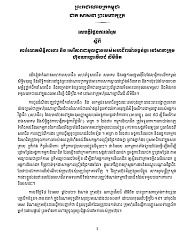
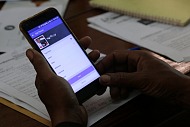

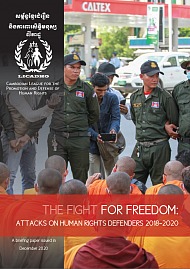
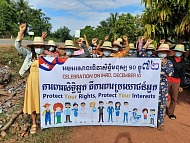
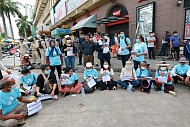
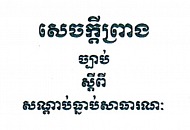
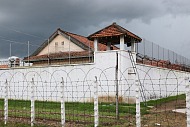
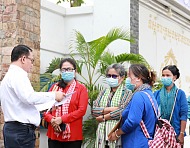
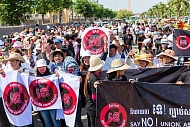
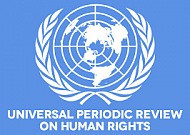
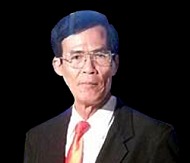
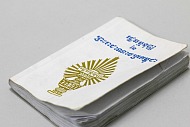
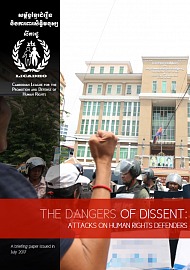
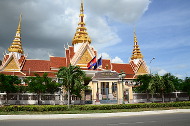
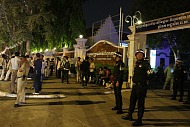
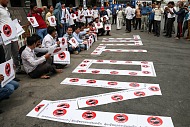

.jpg)
